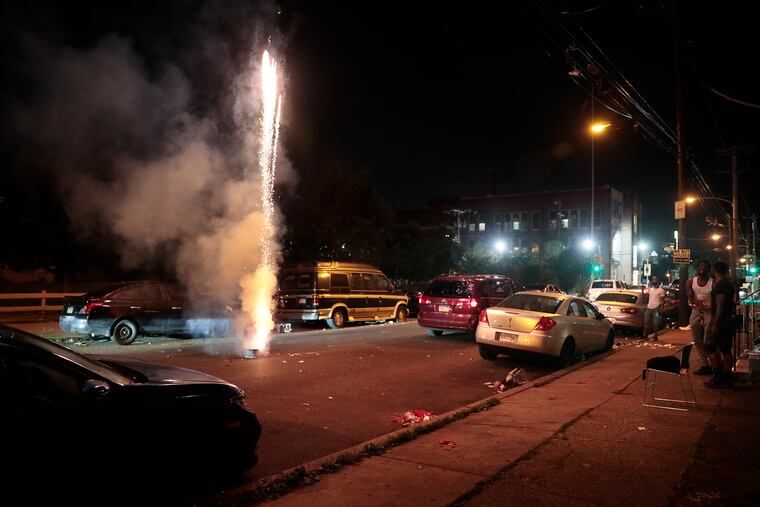Fireworks can trigger PTSD for veterans and gun violence survivors. Here are some coping tips.
Fireworks are harmless fun to most people, but they can also cause heightened anxiety and stress for veterans and survivors of gun violence.

For the last month, the sounds of fireworks have filled Philadelphia streets at all hours.
While there won’t be any large fireworks displays in the city this year, due to the coronavirus pandemic, the holiday weekend will likely be even noisier. With many leisure activities still off-limits, fireworks have become a way for people to pass the time. Between May 29 and June 29, Philadelphia police received 8,526 complaints about fireworks.
While fireworks can be fun for most people, mental health experts say the loud booms and pops can be stressful and trigger post-traumatic stress disorder (PTSD) symptoms for trauma survivors — particularly veterans and those affected by gun violence — especially when they are sporadic. This year, the situation is exacerbated by the heightened anxiety from the pandemic and civil unrest, said Leah Blain, clinic director at Steven A. Cohen Military Family Clinic at Penn Medicine.
“There are lots of other factors going on at the same time causing increased anxiety,” Blain said. “That can worsen symptoms on its own for people who are living with PTSD, and then the fireworks are a trigger happening on top of that heightened anxiety.”
Veterans don’t fear fireworks, said Pete Freudenberger, an Army veteran and a staff clinician at the Cohen clinic. They fear activation, which is their trained response to loud noises and explosions.
“When you’re in training, you’re told to respond to these noises in combat, to save people and address the situation,” he said. “There’s a switch that turns on, and when you’re getting prolonged exposure, it can be hard to regulate your emotions and reactions, because you’re being activated over and over again.”
Being in that state of anxiety can harm relationships, Freudenberger said. It can also affect someone’s ability to focus, even on simple tasks.
The unpredictable nature of fireworks this year has kept some people on guard because they feel like there’s danger, Blain said. For many people, it has also disrupted sleep, a critical protective factor for mental health. Blain recommended using a white noise machine and earplugs, and stopping use of computer or phone screens well before bedtime to ensure better sleep.
“You want to make sure that the time that isn’t disruptive is as restful as possible,” she said. “It can also be helpful to have some grounding tools to remind yourself that you are safe if you do get awoken, like telling a bedfellow to tell you that it’s just a firework.”
For those who can’t fall back asleep after being awoken by fireworks, Blain said, doing something soothing and monotonous can help. Tasks like doing the dishes or reading a book might get you back into sleep mode sooner. Try not to look at screens or turn on bright lights, she said.
For those setting off fireworks, Freudenberger recommended first talking to their neighbors, especially if they know that someone is a veteran. This might help veterans feel more supported and respected by their communities, he said.
“If they say that it’s something that really bothers them, then you can move to another location,” Freudenberger said. “It’s something easy that you can do to help.”